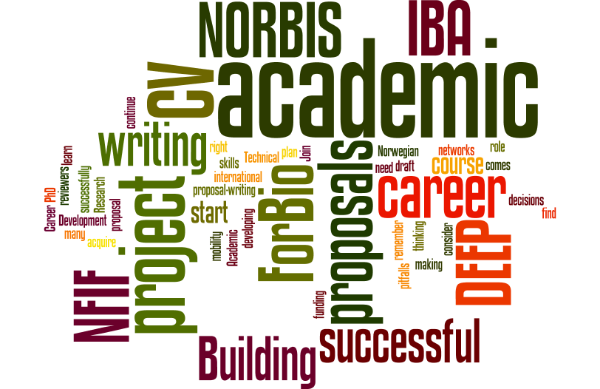PhD course in Science Communication
We offer you a three-day course from Wednesday to Friday. Each day will be filled with inspiring lectures, practical exercises, group discussion and workshops as well as sessions for individual feedback on how you present your research ideas and messages. All participants will be asked to hold a 5-minutes oral presentation of their research project on Day 3.
When:
Wed 24 – Fri 26 January 2018
Where:
Lecture room 4020, 4/F West Wing, Geophysical Institute, University of Bergen (entry from Jahnebakken 5 or Allégaten 70).
Organisers:
- Norwegian research school network consisting of:
- IBA - Infection Biology and Antimicrobials
- NFIF - Norwegian PhD School of Pharmacy
- NORBIS - National Research School in Bioinformatics, Biostatistics and Systems Biology
- ForBio - Research School in Biosystematics
- DEEP - Norwegian Research School for Dynamics and Evolution of Earth and Planets
- Digital Life Norway Research School
- CHESS - Research school on changing climates in the coupled earth system
You will learn how to:
- communicate your research and scientific field to different target groups
- use your voice and body language to convey your message in oral presentations
- use a selection of visualisation techniques and methods to make complex research data understood by a wide range of audiences
- use visual communication tools to translate your research into an illustration
- find suitable approaches on how to receive and give feedback
Preparations prior to course start:
- Prepare a 5 min oral presentation conveying your research idea, which is to be presented on the final course day.
The target group for your presentation will be persons with higher educational background different from your own. Be aware not to use technical terms only understood by researchers in your own research field.
- Prepare an illustration/figure you will use in your 5-min oral presentation. You may prepare more than one if necessary.
We ask you to draw a picture that supports what you will talk about during your presentation which you will be presenting on the final day.
- Optional: bring your research data. On the individual feedback session on Day 2 there might be an opening for participants to receive personal feedback from Jan Byska, Noeska Smit and Pina Kingman on visualization and illustration of your research data.
Contributors:
- Synnøve Vindheim Svardal: Communication advisor at UiB. Svardal has long experience with training people in how to communicate a message. She is also a coach for the local Researcher Grand Prix-candidates.
- Tane Høisæter: Producer at DigUiB Learning and dissemination lab, UiB. Høisæter is a producer at UiB, and has worked several years as a journalist and copy editor for the two main broadcasters in Norway, NRK and TV 2. Experienced radio news presenter and live interviewer.
- Pina Kingman: Master degree in Biomedical Communications. Pina is an award-winning animator and film maker, focusing on telling scientific and medical stories so that the information is accessible to any audience; www.pinakingman.ca
- Noeska Smit: Associate professor in the Visualisation group at the Department of Informatics, UiB, specialized in medical visualisation.
- Jan Byska: PostDoc in the Visualisation group at the Department of Informatics, UiB, specialized in molecular visualization.
Registration - deadline 18 December
The course schedule
The course schedule can be downloaded here.
Selection:
DEEP has a limited number of places in this course, and we will select those of you whom are most likely to benefit from this course.
